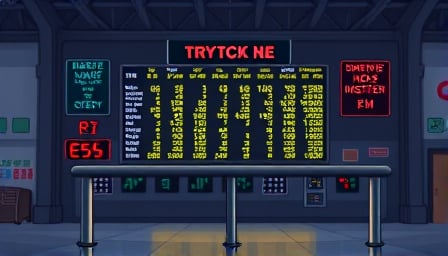Everest Group Ltd: A Stock Slump Amidst Market Turbulence
Everest Group Ltd., a long‑standing player in the reinsurance and insurance arena, has suffered a noticeable erosion of shareholder value over the past twelve months. The company’s shares have slumped to a level that would erase more than eleven percent of the capital invested by an investor who purchased stock a year ago. In concrete terms, a $10,000 investment would now be worth less than $8,900 if liquidated at the current market price.
A Stark Decline in Share Value
The drop is not trivial. While the company’s market capitalization remains robust—hovering above $14 billion—the underlying share price erosion signals deeper concerns about investor confidence and market perception. For a firm that has been a staple of the New York Stock Exchange since its 1995 IPO, such a decline challenges the narrative of stability that has long underpinned its valuation.
Industry‑Wide Volatility Versus Company‑Specific Dynamics
The financial sector at large is grappling with volatility, as regulatory pressures, shifting interest rates, and geopolitical uncertainties ripple through asset valuations. Some insurers and reinsurers are capitalizing on niche opportunities, while others falter under the strain of low‑yield environments and heightened claim activity.
Everest Group’s specialization in reinsurance and insurance services could, in theory, act as a buffer. Reinsurance, by its very nature, spreads risk across a broader base, potentially insulating the firm from localized shocks. Yet the current price trajectory suggests that market participants are not fully convinced of this protective advantage—or that the firm’s risk‑management framework can deliver the promised resilience.
Longevity as a Double‑Edged Sword
With a history spanning more than a quarter of a century, Everest Group brings an invaluable repository of experience. Its deep roots in the industry should, in principle, translate to seasoned risk assessment and a proven track record of navigating turbulent periods. However, longevity also breeds complacency; entrenched processes may hinder swift adaptation to rapid market shifts, leading to the kind of price pressure seen today.
Investor Implications
For investors, the immediate implication is clear: a tangible erosion of capital. Over a year, a loss of 11% on a $10,000 investment is significant, especially when compared to the broader market performance during the same period. Long‑term stakeholders must decide whether the company’s substantial market cap and institutional experience justify a continued bet, or whether a reallocation toward more resilient or high‑yield opportunities is warranted.
The Bottom Line
Everest Group Ltd. stands at a crossroads. The recent share price decline is a stark reminder that market sentiment can shift rapidly, even for well‑established firms. While its substantial market capitalization and industry pedigree suggest that the company possesses the tools to weather the current storm, the true test will be how effectively it translates those assets into tangible value for shareholders in the months and years ahead.
